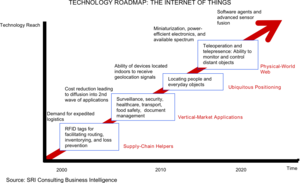I have written several blog entries about the Internet of Things. But I have not really defined it very well. I read as many articles about the topic as I can find since I find it personally fascinating. To me this is mankind finally using computer technology to affect everyday life and goes far beyond things you can do with a PC or tablet.
I recently saw an article that summarized the direction of the Internet of Things into three categories – and this is a good description of where this is all headed. These categories are:
Knowledge of Self. This part of the Internet of things is in its infancy. But the future holds the promise that the Internet can be used to help people with self-control, mindfulness, behavior modification and training.
Today there are gimmicky things people are doing with sensors, such as counting the number of times you have opened the refrigerator as a way to remind you to lose weight. But this can be taken much further. We are not far from a time when people can use computers to help them change their behavior effectively, be that in losing weight or in getting your work done on time. Personal sensors will get to know you intimately and will be able to tell when you are daydreaming or straying from your tasks and can bring you back to what you want to accomplish. Computers can become the good angel on your shoulder should you choose that.
Probably the biggest promise in this area is that computers can be used to train anybody in almost anything they want to know. The problem with the Internet today is that it is nearly impossible in a lot of cases to distinguish between facts and fiction. But it ought to be possible to have the needed facts at your fingertips in real-time. If you have never changed a tire your own personal computer assistant will lead you through the steps and even show you videos of what to do as you do it for the first time. But such training could bring universal education to everybody in the world, which would be a gigantic transformation of mankind – and would obviate the widespread ignorance and superstitions that still come today from lack of education.
Knowledge of Others. Perhaps the two most importance in this area will be virtual presence and remote health care.
With virtual presence you will be able to participate almost anywhere as if you were there. This takes the idea of video conferencing and makes it 3D and real-time. This is going to transform the way we do business, hire employees and seek help from others.
But perhaps the biggest change is going to come in health care. Personal medical sensors are going to be able to monitor your body continuously and will alert you to any negative change. For instance, you will know when you are getting the flu at the earliest possible time so that you can take medicine to mitigate the symptoms.
There is also great promise that medical sensors will make it possible for people to live in their own homes for longer as we all age, something just about everybody wants. Sensors might even change the way we die. Over 80% of people say they want to die at home, but in 2009 only 33% did so. Medical monitoring and treatment tied to sensors ought to let a lot more of us die in the peace of our own beds.
Perhaps the biggest promise of personal monitors is the ability to detect and treat big problems before they get started. Doctors are saying that it ought to be possible to monitor for pre-cancerous cells and kill them when they first get started. If so, cancer could become a disease of the past.
Knowledge of the World. The Internet of Things promises to eventually have sensors throughout the environment. More detailed knowledge of our surroundings will let us micromanage our environment. Those who want a different amount of humidity in the air will be able to have this done automatically in rooms where they are alone.
But remote sensors hold the most promise in areas of things like manufacturing and food production. For instance, sensors can monitor a crop closely and can make sure that each part of a field gets the right amount of water and nutrition and that pests are controlled before they get out of hand. Such techniques could greatly increase the production of food per acre.
And we can monitor anything. People living near to a volcano, for example, will know far ahead of time when there has been an increase in activity.
Monitoring the wide world is going to be the last part of the Internet of Things to be implemented because it is going to require drastic new technologies in terms of small sensors and the ability to interpret what they are telling us. But a monitored world is going to be a very different world – probably one that is far safer, but also one where there is far less personal freedom – at least the freedom to publicly misbehave.
